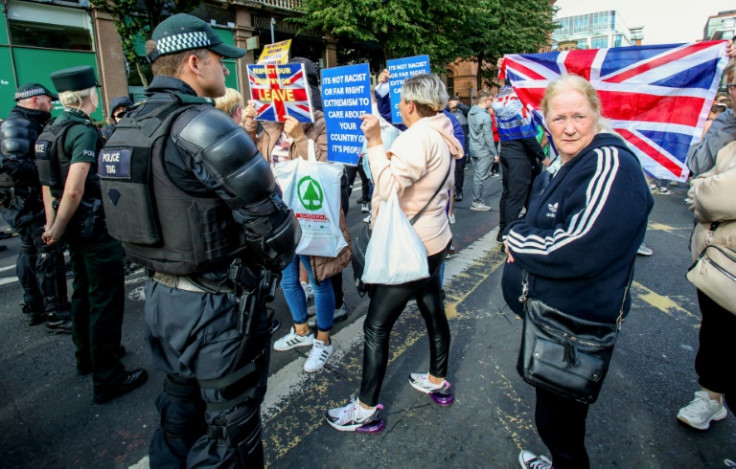
Dublin witnessed a second night of anti-immigrant unrest on Tuesday, underscoring the deepening divisions over Ireland's asylum policies as violent mobs clashed with Gardaí outside a temporary refugee centre.
The protest flared outside the Citywest Hotel in Saggart, southwest Dublin, which currently houses asylum seekers under the state's protection system.
The demonstration spiralled into violence as protesters attacked officers with fireworks, glass bottles and bricks. A Garda van was set ablaze, and one officer sustained a foot injury during the clashes.
Gardaí confirmed six arrests as nearly 300 officers, including riot control units and mounted police, were deployed to restore order.
'A Mob Intent on Violence'
Footage from the scene showed protesters waving Irish flags and holding anti-immigrant placards as they faced off against lines of riot police.
By nightfall, fireworks and bottles were being launched at officers, while some demonstrators attempted to breach police lines using carts and improvised weapons.
Garda Commissioner Justin Kelly condemned the violence as 'thuggery', describing the group as 'a mob intent on violence'.
'This was obviously not a peaceful protest,' he said, vowing that those responsible would be identified and prosecuted.'
Political Leaders Condemn Violence
Irish leaders swiftly condemned the scenes.
Prime Minister Micheál Martin said there could be 'no justification' for the 'vile abuse' and 'violent disorder' directed at Gardaí. He praised officers who 'acted courageously and quickly to restore order'.
Justice Minister Jim O'Callaghan echoed the condemnation, promising a 'forceful response' and emphasising that 'peaceful protest is a cornerstone of our democracy, but violence is not'.
Residents of Saggart, a usually quiet suburban community, told Irish media the events did not reflect local sentiment. While some voiced concerns about the number of asylum seekers in the area, they rejected what they described as a 'mob mentality'.
A Crime 'Weaponised'
The unrest followed an alleged sexual assault near the Citywest facility last week.
A 26-year-old man, reportedly an asylum seeker, has been charged in connection with the attack on a 10-year-old girl.
Officials have warned that the incident is being weaponised by far-right agitators to stir up anti-immigrant sentiment across the country.
The Prime Minister acknowledged the 'anger and concern' in response to the alleged assault, but condemned those 'using a tragedy to promote hate'.
Echoes of Past Unrest: A Deepening Political Divide
The violence marks a dangerous escalation in a growing trend of anti-immigrant agitation across Ireland.
The scenes echo the November 2023 Dublin riots, when far-right protesters used a knife attack as justification for widespread rioting and destruction in the capital.
Analysts and rights groups warn these incidents are not isolated acts of public disorder but evidence of a more coordinated and emboldened far-right movement. These groups are increasingly using social media and the country's housing crisis to fuel resentment toward asylum seekers and refugees.
This presents a significant political challenge for the government, which must not only hold violent agitators accountable but also confront the disinformation networks driving radicalisation.
As Gardaí continue to monitor potential flashpoints nationwide, officials have pledged to protect both frontline officers and vulnerable asylum seekers from further unrest. Authorities are also calling for unity in the face of what they describe as Ireland's 'darker forces', determined to exploit division and fear.







